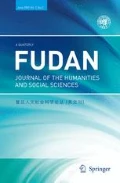Abstract
Through a semantic analysis of such common words as “good,” “right,” and “rights,” this article tries to argue that “justice” as a value-term basically means “no unacceptable harm to the human” or “respecting the deserved rights of the human” in the meta-ethical sense. In real life, then, the becoming of universal justice as an authentic moral virtue depends first and foremost upon the concrete and dynamic cultivation of such a universalistic ethical attitude: regarding neither merely oneself nor some persons specially related to oneself, but everyone as the “human,” and valuing all of them morally important and dignified so as not to do morally unacceptable harm to them, but to respect their deserved rights.
Similar content being viewed by others
Notes
As for the differentiation between the so-called meta-ethics and normative ethics, see Frankena (1973, pp. 4–5, 96).
It is quite strange that, although modern Western scholars have researched into the relationship between the good and the right for a long time and often made a clear definition of the value-term of the “good” as “desirability,” they have scarcely made a clear definition of the value-term of the “right” as “acceptability,” even if they themselves have also understood and used it in this very sense.
References
Aquinas, Thomas. 1945. Summa theologica. Anton C. Pegis Basic writings of Saint Thomas Aquinas (trans. English Dominican Fathers). Vol. One-I. New York: Random House.
Aristotle. 2009. The Nicomachean ethics (trans: David Ross). Oxford: Oxford University Press.
Augustine, Aurelius. 1998. The city of god against the pagans. (trans: Dyson, R.W.). Cambridge: Cambridge University Press.
Bentham, Jeremy. 1907. An introduction to the principles of morals and legislation. Oxford: Clarendon.
Chan, Wing-tsit. 1963. A source book in chinese philosophy. Princeton: Princeton University Press.
Dworkin, Ronald. 1978. Taking rights seriously. Cambridge: Harvard University Press.
Frankena, William K. 1973. Ethics. Englewood Cliffs: Prentice-Hall.
Hobbes, 1991. Leviathan. Cambridge: Cambridge University Press.
Hume, David. 1948. A treatise of human nature. In Hume’s moral and political philosophy, ed. Henry D. Aiken. New York: Hafner.
Kant, Immanuel. 1956. Critique of practical reason. (trans: Beck, Lewis W.). Indianapolis: Bobbs-Merrill.
Kant, Immanuel. 1970. Political Writings. (trans: Nisbet, H.B.). Cambridge: Cambridge University Press.
Kierkegaard, Soren. 1983. Fear and trembling/repetition. (trans: Howard Hong and Edna Hong.). Princeton: Princeton University Press.
Knoblock, John. 1988–1994. Xunzi: A translation and study of the complete works. (trans: Knoblock, John) 3 vols. Stanford: Stanford University Press.
Lau, Din Cheuk. 1970. Mencius. ( trans: Lau, Din Cheuk). Harmondsworth: Penguin.
Legge, James. 1960. The Chinese classics. (trans: Legge, James). vol. 1. Hong Kong: University of Hong Kong Press.
Liu, Qingping. 2007. “Confucianism and corruption”. Dao: A Journal of Comparative Philosophy 6: 1.
Liu, Qingping. 2012. On the right itself: A meta-ethical reading. Fudan Journal of the Humanities and Social Sciences 5: 4.
MacIntyre, Alasdair. 2007. After virtue: A study in moral theory. Notre Dame: The University of Notre Dame Press.
Mill, John Stuart. 1910. Utilitarianism, liberty, and representative government. London: J. M. Dent & Sons.
Moore, George Edward. 1993. Principia ethica. Cambridge: Cambridge University Press.
Parfit, Derek. 1986. Reasons and persons. Oxford: Oxford University Press.
Plato. 2004. Republic. (trans: Reeve, C.D.C.). Indianapolis: Hackett.
Prichard, Harold Arthur. 1912. Does moral philosophy rest on a mistake? Mind 21: 81.
Rawls, John. 1971. A theory of justice. Cambridge: Harvard University Press.
Ross, William David. 1930. The right and the good. London: Oxford University Press.
Schopenhauer, Arthur. 1965. On the Basis of Morality. (trans: Payne, E.F.J). Indianapolis: Bobbs-Merrill.
Sidgwick, Henry. 1962. The methods of ethics, 7th ed. London: Macmillan.
Watson, Burton. 1963. Mo Tzu, basic writing. (trans: Watson, Burton). New York, Columbia University Press.
Zhu, Xi. 1983. Sishu Zhangju Jizhu [四书章句集注]. Beijing: Zhonghua Shuju [中华书局].




